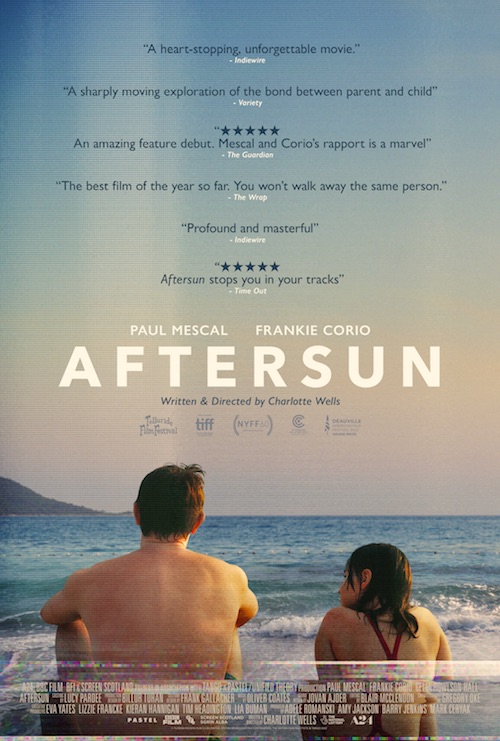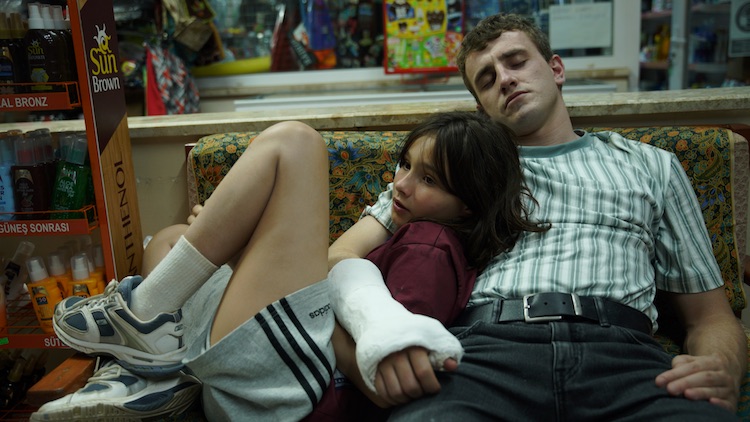On the surface, very little happens in Aftersun. Most of its scenes consist of a father and his 11-year-old daughter lounging by the pool, enjoying meals and engaging in various tourist activities. Despite some moments of mild tension, the two seem to have a positive and typical father-daughter relationship. There are no giant fights, no overly harsh words, no hints of abuse or trauma.
But underneath the sunny façade, the film packs a quietly devastating punch. While it might be too deliberate and subtle for casual viewers, those who devote their attention will be rewarded with a deeply emotional experience. With her feature debut, writer/director Charlotte Wells proves that she’s a filmmaker to watch.

Aftersun observes young Sophie (Frankie Corio) and her father, Calum (Paul Mescal), as they vacation at a Turkish resort. Calum and Sophie’s mother have recently divorced, and Sophie is at the age where her childlike joy and adoration of her father are beginning to be replaced by her awareness of a more complex world, complicated emotions and the possibility that her father may have his own struggles. The story is partially told through home video footage, with hints of someone watching it years later. There are also digressions where the film takes on a darker tone as it follows Calum when Sophie isn’t around, and brief interstitials where an adult Sophie seeks out her father in a strobe-lit, dark nightclub.
It quickly becomes apparent that Aftersun isn’t simply about a father and daughter’s vacation, but rather about that daughter, now grown, looking back on that vacation and recalling the period when she began her transition into her own person. It’s also about Sophie studying her own memories as she tries to piece together the things she wasn’t able to see or understand about her father and potentially make sense of the anguish he hid from the world.
Wells’ film, which she has acknowledged is semi-autobiographical, is a challenging, but not inaccessible, experience. Wells doesn’t dole out information or underline her film’s themes. She trusts the audience to pay attention and perceive what’s happening just off screen and focus on things left unsaid. It’s an observant film, one which will likely reward repeat viewings, in which viewers see how simple actions, like Sophie applying sunscreen, signify the subtle shift in her relationship with Calum, or how some of the film’s bleakest and more experimental moments allow Sophie to ponder the struggles her father kept below the surface. Plot-wise, it’s a movie about a vacation. Thematically, Wells uses slight shifts in her characters’ behavior to explore the moments when children age out of a stage of total dependence and how parents suppress their true struggles as an act of love. Aftersun is about the distance that necessarily exists between individuals, the things we’ll never know about the other person, and the act of trying to reconcile surface actions with emotional realities.
Mescal delivers a complex performance. The film shows Calum solely through Sophie’s eyes, and we can only pick out information about his life based on specifics of conversations and the way Calum tries to put a rosy picture on truths we know must be bleaker. It’s obvious that as he turns 31, Calum is dissatisfied with his life. He struggles with money and is apologetic about the state of the resort he’s taken his daughter to. We can piece together that the divorce has been rough on Calum; he’s had at least one failed relationship in its aftermath, and he’s pursuing a career opportunity that he seems optimistic about, but the subtleties of Mescal’s performance hint that he knows this is another long shot. Aside from a few moments of brief frustration, however, Calum puts a smile on his face to enjoy this time with his daughter; it’s only in the sequences where Sophie imagines the despair that she senses just below the surface that Calum hints at darker feelings that might be thrumming inside.

Frankie Corio and Paul Mescal in “Aftersun.” Photo: A24.
Corio is a solid scene partner for Mescal. She has the difficult task of portraying a character who’s still a child who can be engrossed by video games and karaoke, but is also just starting to notice boys and is aware of how older girls carry themselves and act around them. This plays into her parallel shift as she begins to see her father as a more complicated individual; she loves him but senses the failures he’s running from and the depression he might be battling, even if she can’t put words to it. It’s a nuanced performance, in which she must have a loving rapport with Mescal but also depict the shifts going on as adolescence takes hold. So much of Aftersun depends on audiences identifying with Sophie’s emotions and perceptions, and Corio handles it well.
But the real discovery here is Wells, who approaches this film as a breathtaking act of empathy and imagination. Aftersun is a work of memory and speculation, not explanation. It’s about looking back to examine one’s parents in light of our own maturity and understanding, recognizing the brave faces they put on as acts of love, and pondering the sides of them we’ll never know. While the film is often subtle and not prone to indulge in large emotions, its final shot will likely wreck those who have been paying attention, and prompt them to give their parents a call. This is one of the year’s best films.

| Producer: | Mark Ceryak, Amy Jackson, Barry Jenkins, Adele Romanski |
| Release Date: | November 11, 2022 |
| Running Time: | 102 minutes |
| Starring: | Paul Mescal, Frankie Corio |
| Writer: | Charlotte Wells |
| MPAA Rating: | Rated R (for some language and brief sexual material) |
| Director: | Charlotte Wells |
| Distributor: | Official Site |
| External Info: | A24 Films |

Memelord9000
His behaviour looks really creepy and irritating to me 😑😑😑
S.636WN.CO/V5435WG